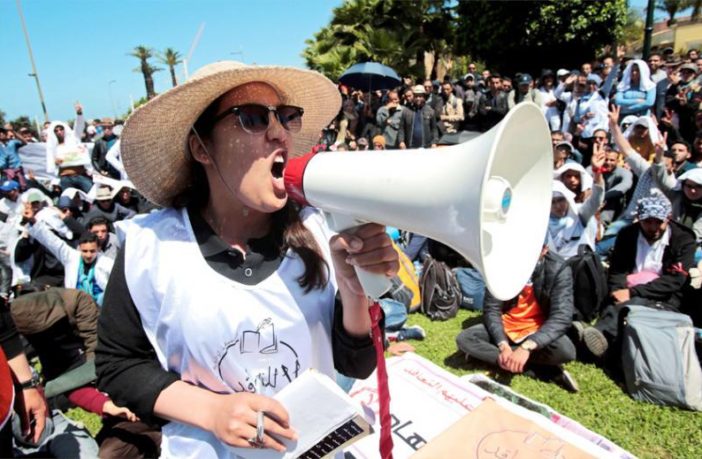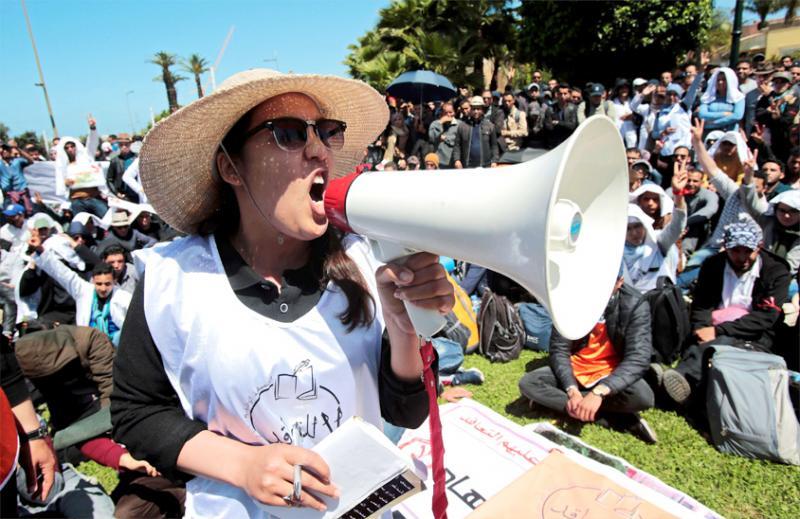Middle East Online
Morocco would appear to have a brighter economic future than its three neighbours to the east.
Young teachers take part in a protest demanding their integration in the civil service as employees of the education ministry in Rabat.
Long-term forecasting is a notoriously difficult art. In a century when the world is changing faster than at any time in history, medium- and even short-term forecasting is no easier.
Consider North Africa: the political stability of Morocco is a given, the fact that Tunisia is muddling along as well and Libya’s descent into chaos do not come as a surprise.
The vast and non-violent popular uprising that has changed the course of Algerian history has, in sharp contrast, taken Western governments and observers by surprise. Whatever the outcome, it will help shape the future of Algeria and its neighbours on the southern and northern rim of the western Mediterranean. There is no underestimating the huge effect a better-managed Algeria would have, not least in terms of faster economic growth and job creation.
Short-term forecasting is devilishly complicated and no easier than medium- or long-term analysis. Much will depend on how events unfold. Will violence prevail? Will a serious political dialogue develop between the army high command and the people? Will splits appear in the army or security forces between the high command and middle-ranking officers? Will the economy take its revenge of months of political uncertainty and economic witch hunting? So many questions to which there are no sure answers.
The country that best knows Algeria did not see the popular uprising coming but then France missed the rise in Tunisia of Zine el-Abidine Ben Ali in 1987 and his demise in 2011. So much for well-staffed embassies and a wealth of academic and media experts. When history is in the making, a degree of modesty is in keeping.
Morocco would appear to have a brighter economic future than its three neighbours to the east. Although growth is too slow to accommodate any serious cut in a high level of unemployment, the Moroccan ship of state is steady as she goes.
Considerable social tensions exist none the less as witnessed by the harshly repressed revolts, particularly in the northern Rif region. Income disparities are as wide as they ever were but three decisions two decades ago have given the state the means of a more ambitious economic policy and handed its diplomacy some very modern tools.
Morocco has over the past generation built up two banks of international repute, Attijariwafa Bank and Banque Marocaine du Commerce Exterieur. Over the past 15 years, the state monopoly of phosphates and fertilisers, the OCP Group, has morphed from a sleeping beauty into a nimble international player that signed a string of joint ventures to produce fertiliser across Africa.
As in other modern economies, the rulers can use the sophistication of such international groups to further foreign policy aims. The intercontinental port of Tangier, Tanger Med, attracted many foreign investors to what was a poor region.
Tanger Med is a showcase of modern management. A major motorway has been completed from Tangier south to Agadir via Rabat, Casablanca and Marrakech and east to Fez and Oujda. The geographical area that now attracts domestic and foreign investment has been hugely broadened compared to a generation ago when it clung to the Rabat-Casablanca axis.
All of this helps spread wealth and employment. Geographically shared and better-spread wealth is important in a country’s stability. However, the ruling class still enjoys exorbitant economic privilege and wealth, capital flight is endemic and many young Moroccans dream of fleeing to a better life in Europe.
Algeria enjoys the benefits of oil and gas wealth and a growing mix of companies, both state and private, across a broad range of economic sectors. But corruption was former President Abdelaziz Bouteflika’s main method of government.
Even worse was his hollowing out of major state institutions: the National Economic and Social Council, where major social and economic affairs were debated; the National Council of Energy, whose input on vital energy issues shaped many decisions; the social science research council and the National Office of Statistics are but shadows of their former selves.
Algerian leaders no longer have the instruments to forecast the future and take rational economic decisions. Many — but not all — private companies are run by cronies of Bouteflika. Cevital, whose owner Issad Rebrab is under lock and key, employs 12,000 people in companies across Algeria, as well as in Europe and Africa. Others are bona fide entrepreneurs.
Everybody lives in fear of the purge against corruption initiated by the army high command: investment decisions are frozen, vital inputs for industry blocked at the customs, workers dismissed. The state oil and gas company Sonatrach, which accounts for 95% of the country’s foreign income, cannot be run on an interim basis for months on end.
The question nobody can answer four months into the uprising is how long this state of affairs is going to last. How much damage to the economy is Algerian Army Chief of Staff Ahmed Gaid Salah, whose peers are quite illiterate economically, prepared to inflict on the country before serious labour conflicts are added to the standoff between the army high command and the people?
However, no one should underestimate the professional talent that exists in Algeria and the capacity many professionals in state and private companies could deploy on the economic front, were a satisfactory solution to the political standoff found.
The disaster of the Bouteflika clan getting thousands of professionals across the board sacked in recent years can be reversed. Forecasting the medium and long term is, thus, beholden to politics; the country’s oil and gas resources are there to stay and they are plentiful.
The same analysis prevails in Tunisia. Many of the problems resulted from the growth of the informal sector and the predatory network of powerful families that stymie competition and the emergence of innovative entrepreneurs. Those not well-connected socially, have much less chance of success, even if they are well-educated.
Neither Algeria nor Morocco nor Tunisia, let alone Libya, offers most of their young people hope of a better future.
In Libya, weapons, which have accumulated in the hands of local militias, make long-term prospects much gloomier than elsewhere in the region. Unlike its neighbours, many foreign powers with contradictory aims are involved.
Two points deserve to be made: The less foreign interference, the better the medium- and long-term outlook is likely to be but as long as North African countries do not offer their young people hope for the future, long-term prospects will remain bleak.
Francis Ghiles is an associate fellow at the Barcelona Centre for International Affairs.
This article was originally published in The Arab Weekly.








